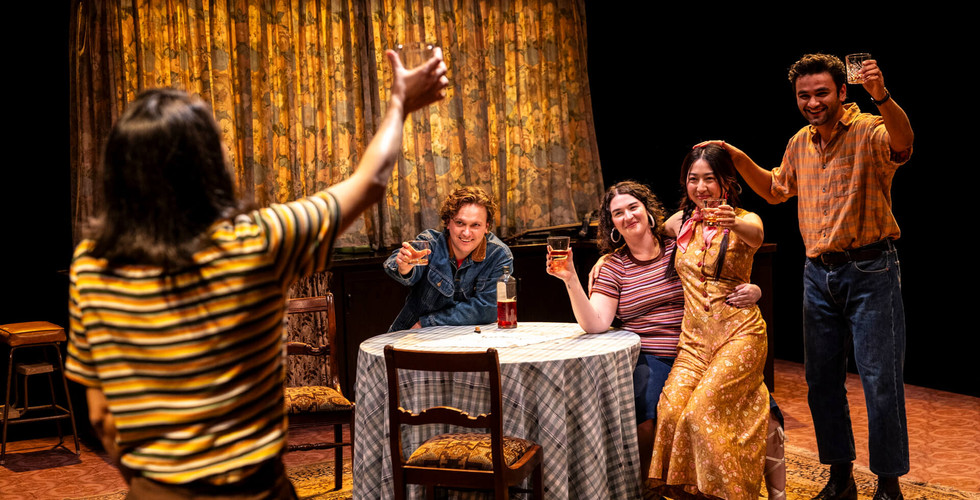Never Closer - Belvoir St (NSW)
- Justin Clarke

- May 31, 2024
- 5 min read
Updated: May 31, 2024
Written by Grace Chapple. Directed by Hannah Goodwin. Presented in association with Essential Workers
A successful transfer to the mainstage for a stunning playwright debut that offers depth, humour and heart in abundance. It's a must see.
Reviewed by Justin Clarke
Belvoir St, Sydney
Until 16th June, 2024
In 2022 I took a chance on an independent production called Never Closer, which was given the space to perform in Belvoir’s 25A program. Upon leaving this production, I was left with a myriad of things, the most obvious being that I’d left my jaw in the theatre. The second was that I had to know everything about this play that I’d seemingly missed in my studies of Australian theatre, only to learn that this was the writer’s debut play. The third was that I was moved both physically and emotionally enough for Never Closer to be one of my favourite productions I’d seen that year.
So needless to say that when I saw that Grace Chapple’s Never Closer was getting a Belvoir mainstage transfer in 2024, I was beyond thrilled.
1977 Ireland, in the midst of The Troubles. Five friends, Deirdre, Niamh, Jimmy, Connor and Mary meet for a reunion that will be their last as a group as Niamh leaves for England to study. Their holiday season festivities take place in the house of Deirdre’s parents before being interrupted by a world that won't be ignored outside.
Never Closer, Belvoir St (2024). Images by Brett Boardman
Fast forward ten years and Deirdre now owns the house after her parents' passing. She has not heard from her best friend, and hears news that others in her close circle are looking to take flight from their small town as well. A sudden Christmas coincidence sees four of the group reunited once more - the air filled with an unspoken tension. Then to make matters worse, Niamh returns and introduces her fiance Harry…he’s English…and he’s a Protestant.
Under the direction of Hannah Goodwin, Never Closer’s mainstage upgrade is seamless, keeping intact Chapple’s fresh, yet somehow familiar writing style and the overall intimacy of the kitchen sink style of the drama that unfolds. There’s a beauty in the lyricism of Chapple’s dialogue that resonates superbly in the mainstage space as the characters' relationships are interwoven and fuelled by a good plastering of alcohol.
...Chapple’s words are filled with a rich context that is delivered acutely on stage.
Goodwin’s balancing of her six actors is like watching a game of chess play out. There’s an establishment of mood at the start of the piece, setting up a loving teenage friendship which is quickly shattered by time and conflict. The reuniting of the five characters in a short reality on stage reveals a keen ability to move audiences in time, if not space, before introducing a stark contrast of comedy with Harry's bumbling Englishman.
It must have been a pleasure for director and writer to work in tandem with each other throughout the rehearsal process as Chapple’s words are filled with a rich context that is delivered acutely on stage. The context of The Troubles that surrounds the outside of the home leaves its mark on each character, before letting loose an ignorant Englishman - “Oh, but this isn’t technically Ireland is it?” he spouts to the shocking groans of the characters (and the audience) during a drinking game.
Goodwin’s decision to more or less keep the original set design from the 25A production translates well in the upstairs Belvoir space maintaining the play’s important intimacy. Grace Deacon’s set is static, with a carpeted floor and frilly curtains that gives Deirdre’s home an aged quality but one that is rich in memory. A box of photographs sits downstairs near her Pa’s favourite chair, reminding us that relationships and connection is at the core of Never Closer’s themes.
Phoebe Pilcher’s lighting design gives the space a warmth that keeps the icy Irish weather outside, whilst also allowing for the chill to creep in during moments of apprehension and physical outbursts. Hues of blue are scattered throughout, adding an ominous atmosphere to key moments and reflecting the ghost stories that are told at the play’s beginning and end.
...I was moved in a way I forgot that theatre could move me
As Deirdre, Emma Diaz is a force to be reckoned with. Her resentment towards Niamh seeps through every raised eye and furrowed brow as she harbours an anger towards her friends who plan to move away, leaving her to stew in the memory of her parents, her unlived life and the conflict of the past. When Diaz breaks down Deirdre’s walls, we see her softness and yearning for connection. Diaz's ability to communicate raw emotion was played out on stage with a passionate quality in the play's strongest moments.
Opposite, Mabel Li’s Niamh is both ignorant and naive towards the hole her absence has left. The shredding of her Irish accent over the space of the ten years, replaced by a posh British roundness is evidence of her assimilation into a world that drew blood from her homeland.
Philip Lynch’s Harry draws the biggest laughs from the audience as the foolhardy, but sweet Englishman. His well-meaning ignorance changes the entire atmosphere of the piece from his first line, right up until his last. Harry himself is an allegory of an invasion closer to home than we realise, which Chapple utilises perfectly. Lynch’s comic timing is placed perfectly in every beat to both raise the stakes while continuing Goodwin’s game of chess.
Adam Sollis’ Connor and Raj Labade’s Jimmy are in stark contrast to each other throughout. Sollis takes on Connor’s brash defending of the Catholics in his home country, to the point of harbouring a vile pent up rage that gives the plays its most brutal pieces of turmoil. Whereas Labade plays a softer love interest to Diaz’s Deirdre, his obvious affection for her showing its own scars and fears.
Meanwhile, Ariadne Sgouros’ Mary is larger than life in her physicality and voice on the mainstage. Her bubbling resentment at third wheeling her friendship of Deirdre and Niamh takes the form of near alcoholism and plenty of laughs. Sgouros is a key player in the relationship between the characters, fuelling their alcoholic ramblings whilst also putting out fires that set ablaze.
We have ditched the star rating for Theatre Thoughts this year, but if our system of awarding visual recognition were still done, it would be without argument five stars. By the end, I was moved in a way I forgot that theatre could move me, erasing my fear that I had hyped up the restaging of Never Closer in my mind, and instead rewarding me yet again with a theatrical experience that will stay with me. I believe I’ve yet again left my jaw on the floor.
Listen to our podcast episode with Hannah Goodwin, Grace Chapple and Emma Diaz here.
Watch the episode over on our Youtube Channel here.
CAST & CREATIVES
EMMA DIAZ. DEIRDRE
RAJ LABADE. JIMMY
MABEL LI. NIAMH
PHILIP LYNCH. HARRY
ARIADNE SGOUROS. MARY
ADAM SOLLIS. CONOR
GRACE CHAPPLE. WRITER
HANNAH GOODWIN. DIRECTOR
PHOEBE PILCHER. LIGHTING DESIGNER
GRACE DEACON. SET DESIGNER
KEERTHI SUBRAMANYAM. COSTUME DESIGNER
ALYX DENNISON. SOUND DESIGNER AND COMPOSER
NIGEL POULTON. FIGHT AND INTIMACY DIRECTOR
LAURA FARRELL. VOCAL COACH
LUKE MCGETTIGAN. STAGE MANAGER
DARCY CATTO-PITKIN. ASSISTANT STAGE MANAGER
MADDISON CRAVEN ASSISTANT STAGE MANAGER
























%20(1).png)
Comments